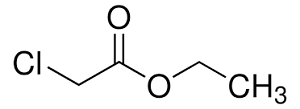Ethyl Chloroacetate

Product Description
Ethyl chloroacetate is a versatile compound used in various industrial applications.
Product:
Ethyl Chloroacetate
CAS:
105-39-5
Synonym:
Chloroacetic acid ethyl ester; cetic acid, 2-chloro-, ethyl ester
Structure:

Typical Characteristics
Appearance
Clear colorless liquid
Boiling point
143 °C
Density
1.145 g/cm3
Flash Point
53 °C
Melting point
−26 °C
Molecular Weight
122.55
Odor
Pungent odor
Purity
99%
Refractive index
1.421
Uses, Applications & Markets
Key applications
get a quote
We Offer Ethyl Chloroacetate
in various grades
A few of the grades available are listed below:



Ethyl Chloroacetate used in many
industry applications
Ethyl chloroacetate, with the chemical formula CH2ClCOOCH2CH3, is a versatile compound used in various industrial applications. Here's a breakdown of its main uses:
- Chemical Intermediates: Ethyl chloroacetate is primarily employed as an intermediate in the synthesis of various organic compounds. It undergoes reactions such as esterification, alkylation, and substitution to form complex molecules used in pharmaceuticals, agrochemicals, and specialty chemicals.
- Pharmaceuticals: It serves as a key building block in the production of pharmaceuticals and drug intermediates. Ethyl chloroacetate-based compounds are utilized in the synthesis of active pharmaceutical ingredients (APIs) for medications such as analgesics, antispasmodics, and cardiovascular drugs.
- Agrochemicals: Ethyl chloroacetate is used in the manufacture of agrochemicals, including herbicides, insecticides, and fungicides. It acts as a precursor in the synthesis of active ingredients and intermediates that help control pests, weeds, and diseases in agriculture and horticulture.
- Chemical Synthesis: It finds application in organic synthesis for the preparation of various compounds with functional groups such as carboxylic acids, alcohols, and amines. These compounds have uses in diverse industries, including pharmaceuticals, polymers, and flavors.
- Solvent: Ethyl chloroacetate can serve as a solvent in certain chemical processes and formulations. Its solvent properties make it useful in applications such as paint and coating formulations, cleaning agents, and specialty chemical manufacturing.
- Flavor and Fragrance: In the flavor and fragrance industry, ethyl chloroacetate may be used as a flavoring agent or as a component in fragrance formulations. Its fruity and ester-like aroma profile contributes to the creation of specific scents and flavors in food products and perfumes.
- Laboratory Reagent: It is utilized as a reagent in laboratory research and chemical analysis. Ethyl chloroacetate may participate in organic transformations and chemical reactions for the synthesis of new compounds or for analytical purposes such as derivatization in chromatography.
- Polymerization: Ethyl chloroacetate can be involved in polymerization reactions to produce certain types of polymers or copolymers. These polymers may have applications in industries such as plastics, adhesives, coatings, and elastomers.
- Specialty Chemicals: It is used in the formulation of specialty chemicals and industrial additives for specific applications. Ethyl chloroacetate-based additives may enhance the performance, stability, or functionality of various products, including coatings, adhesives, sealants, and lubricants.
- Research and Development: Ethyl chloroacetate plays a role in scientific research, process development, and product innovation across multiple industries. It enables the exploration of new chemical reactions, synthetic methodologies, and the discovery of novel compounds with potential commercial applications.